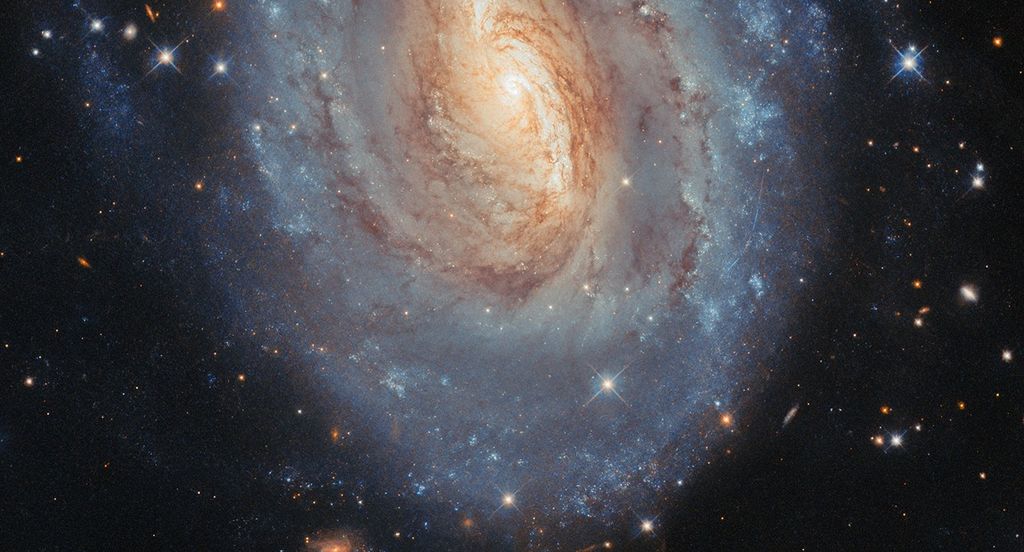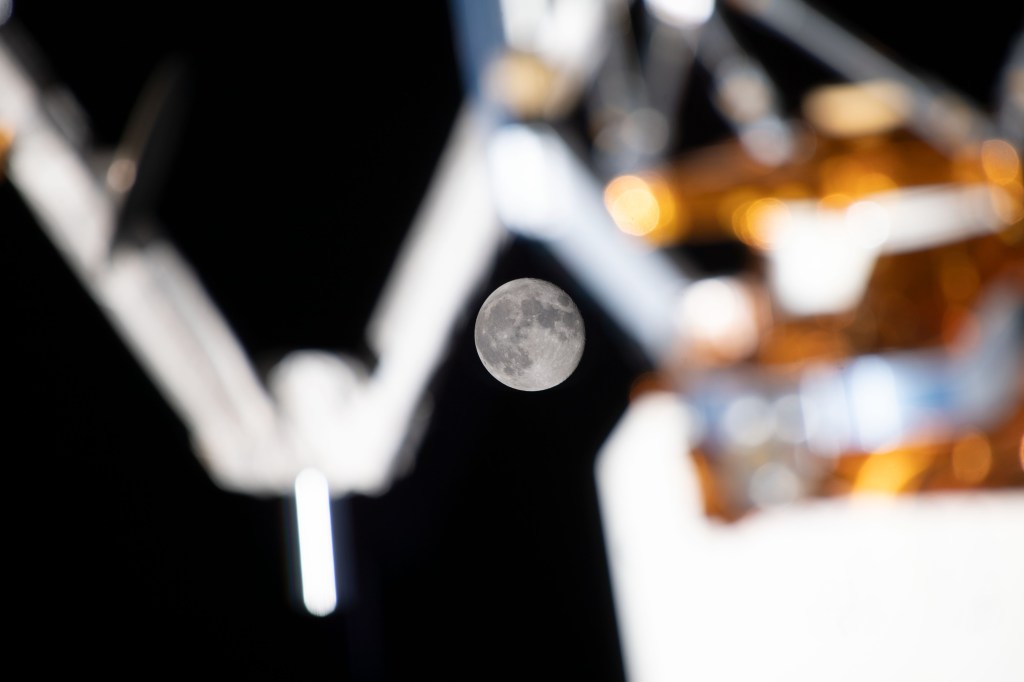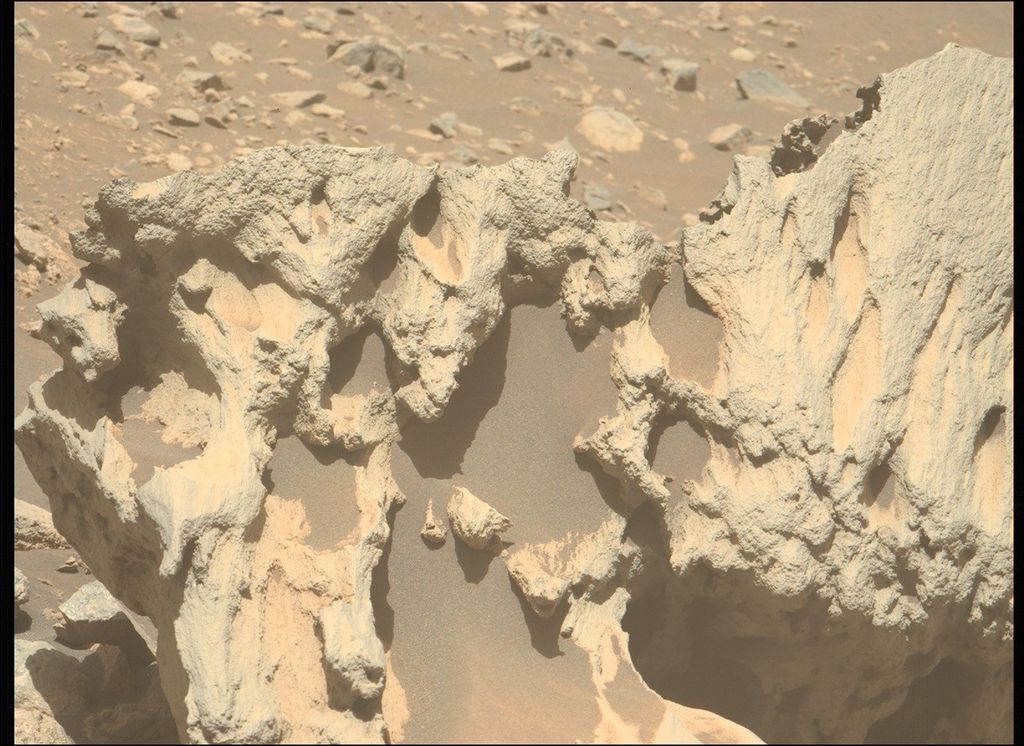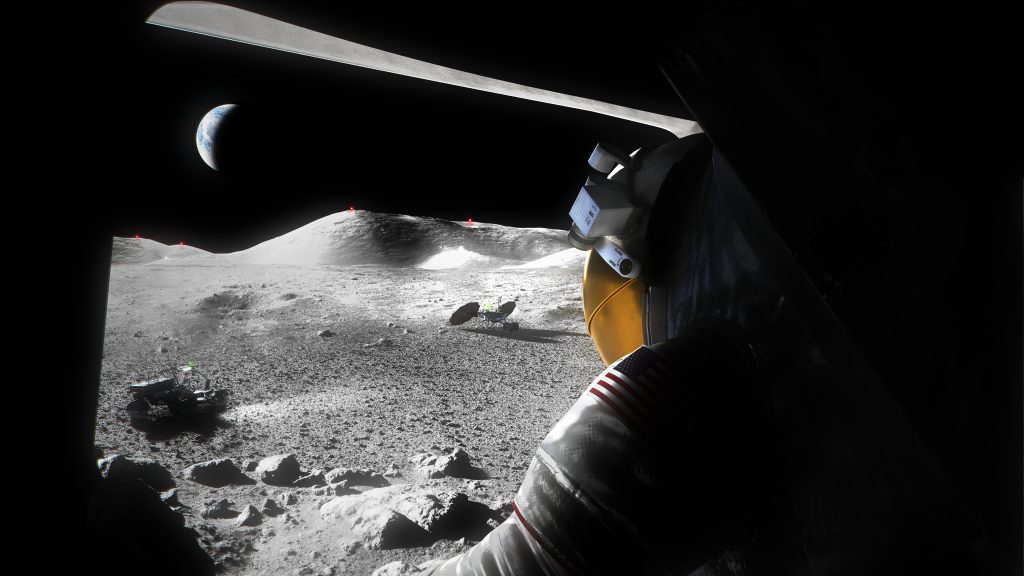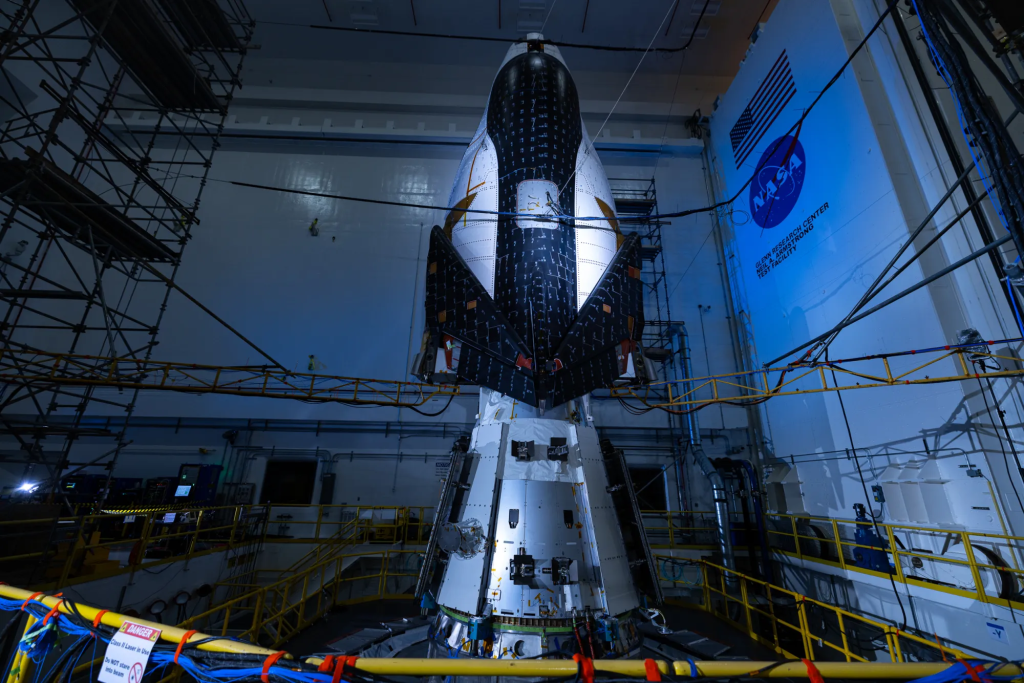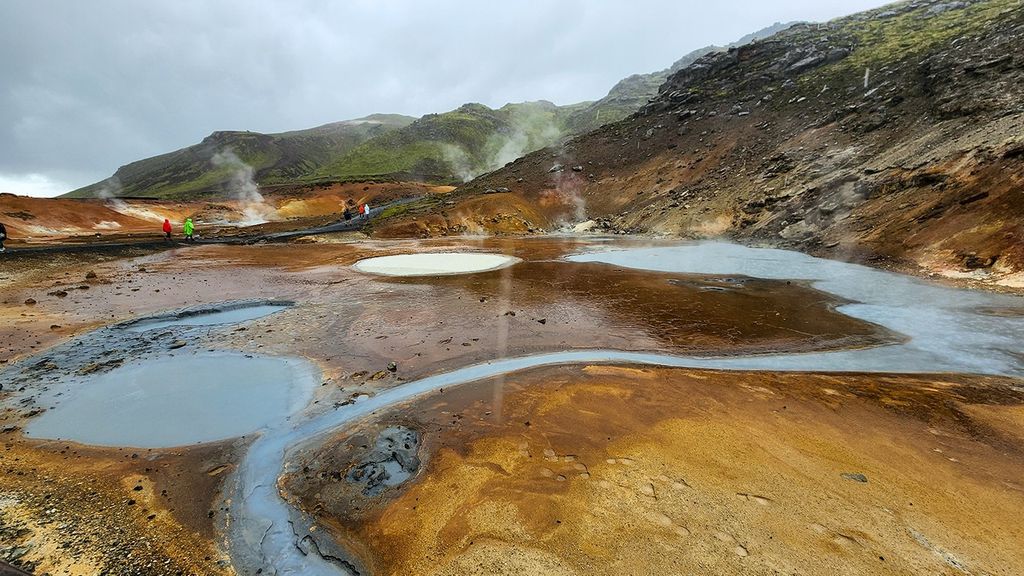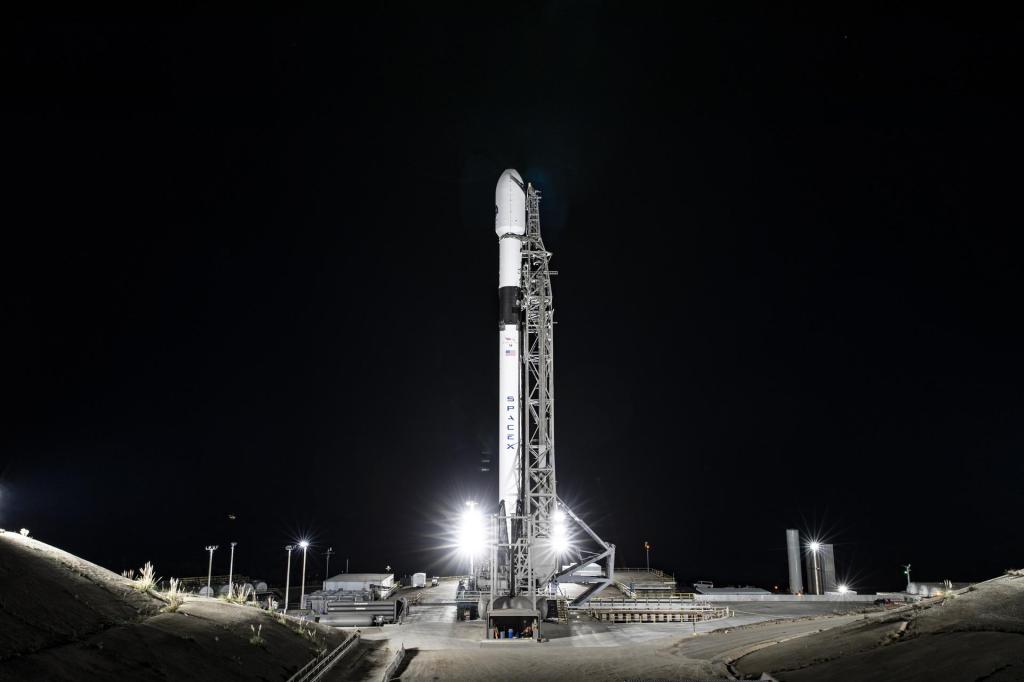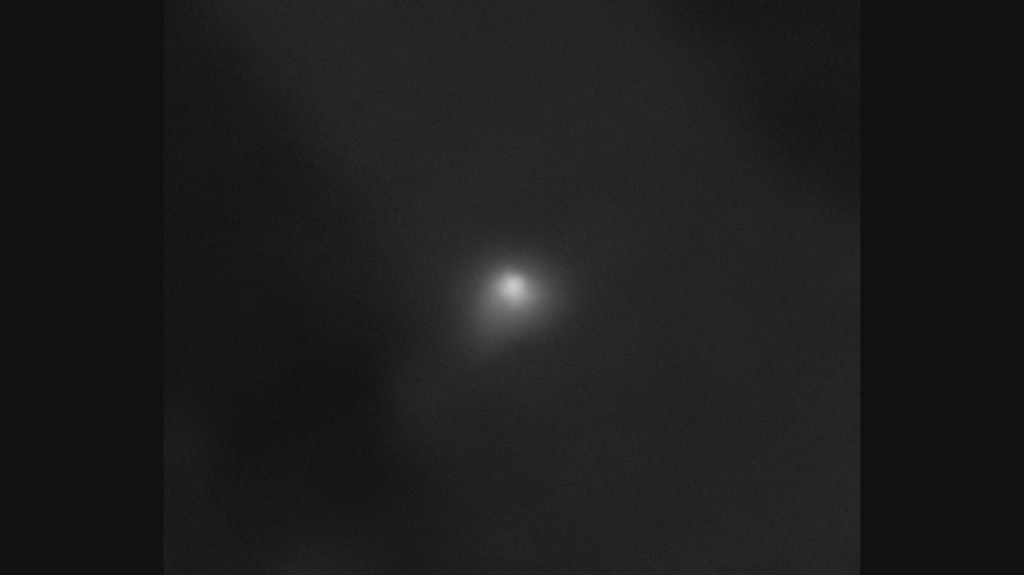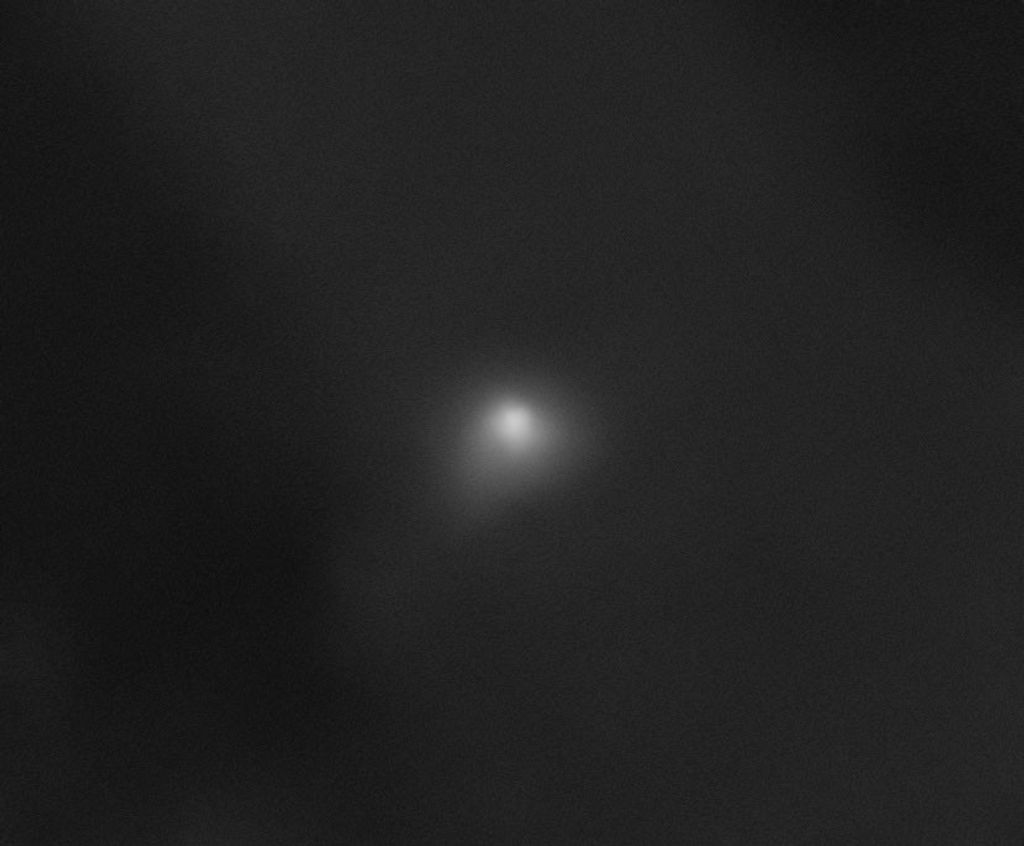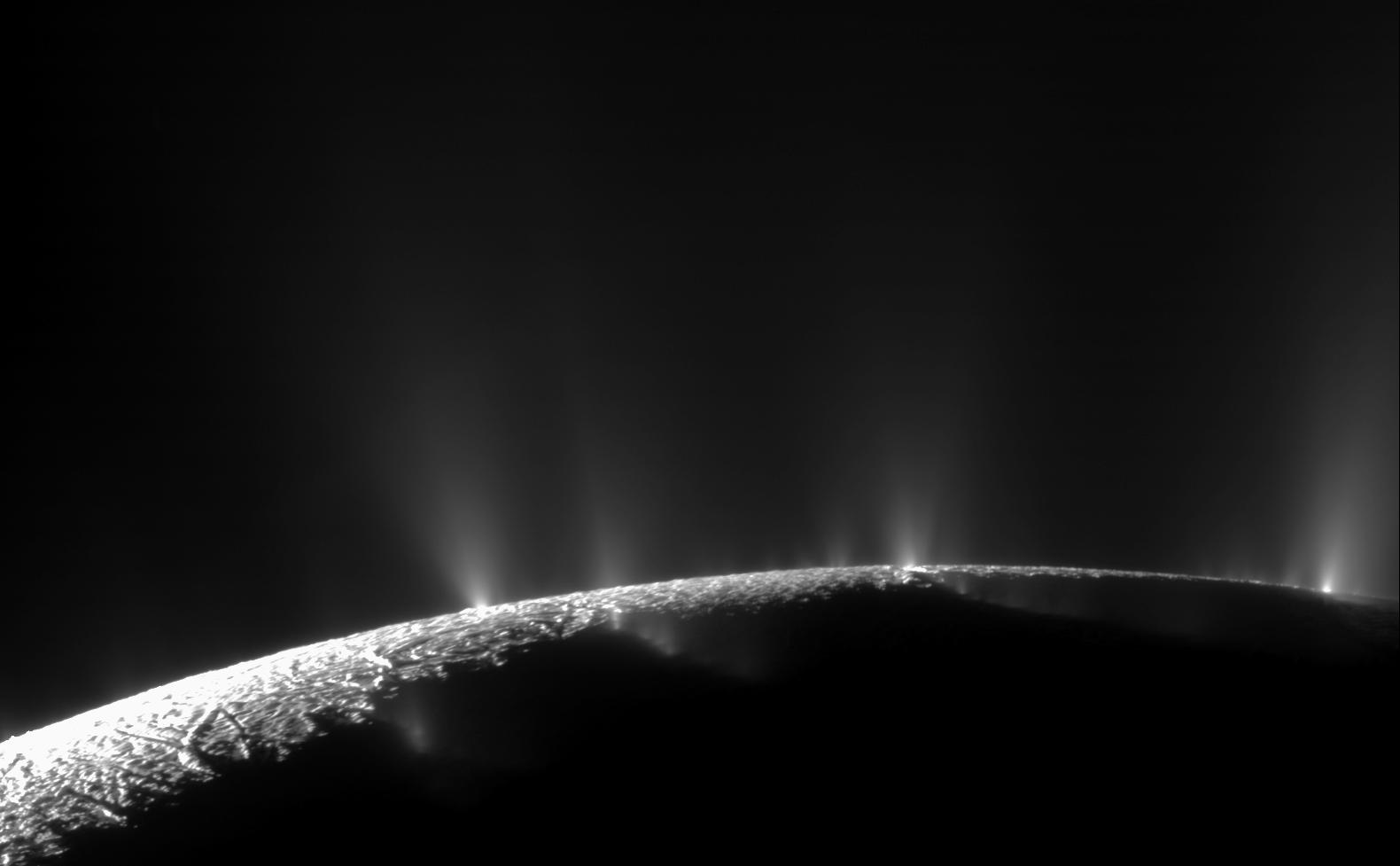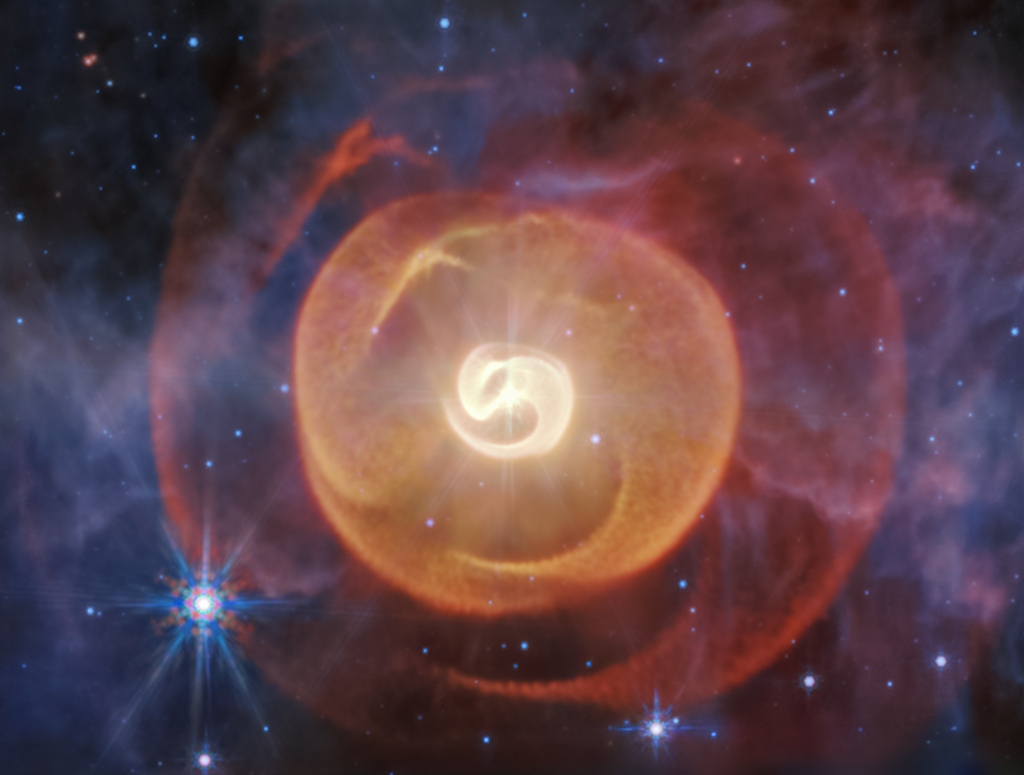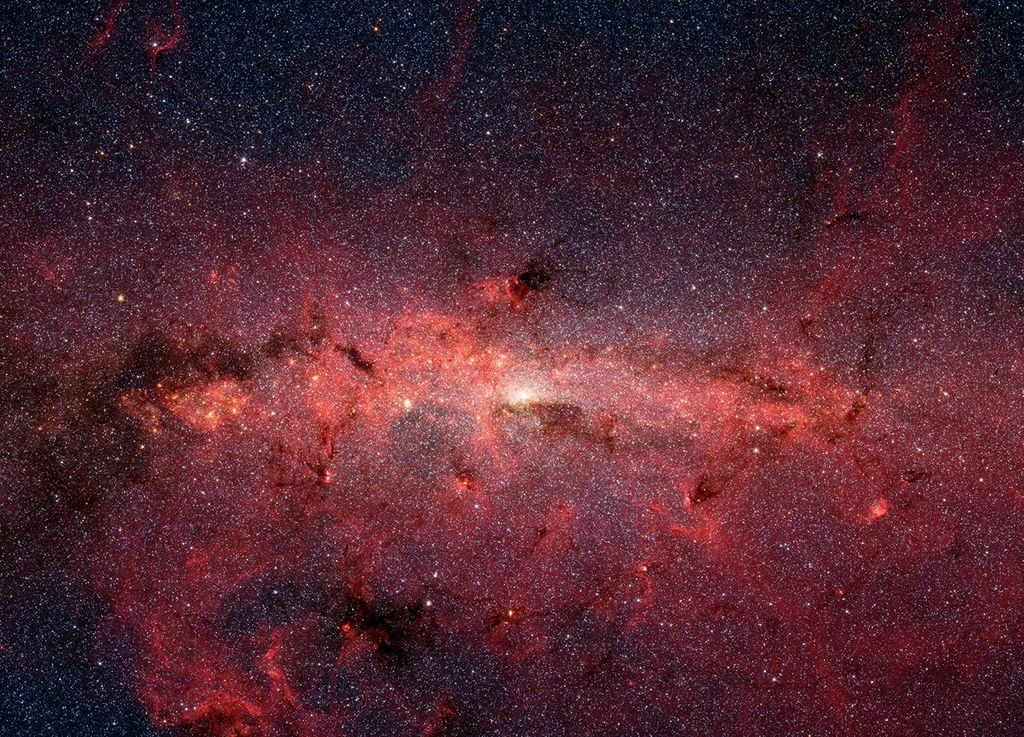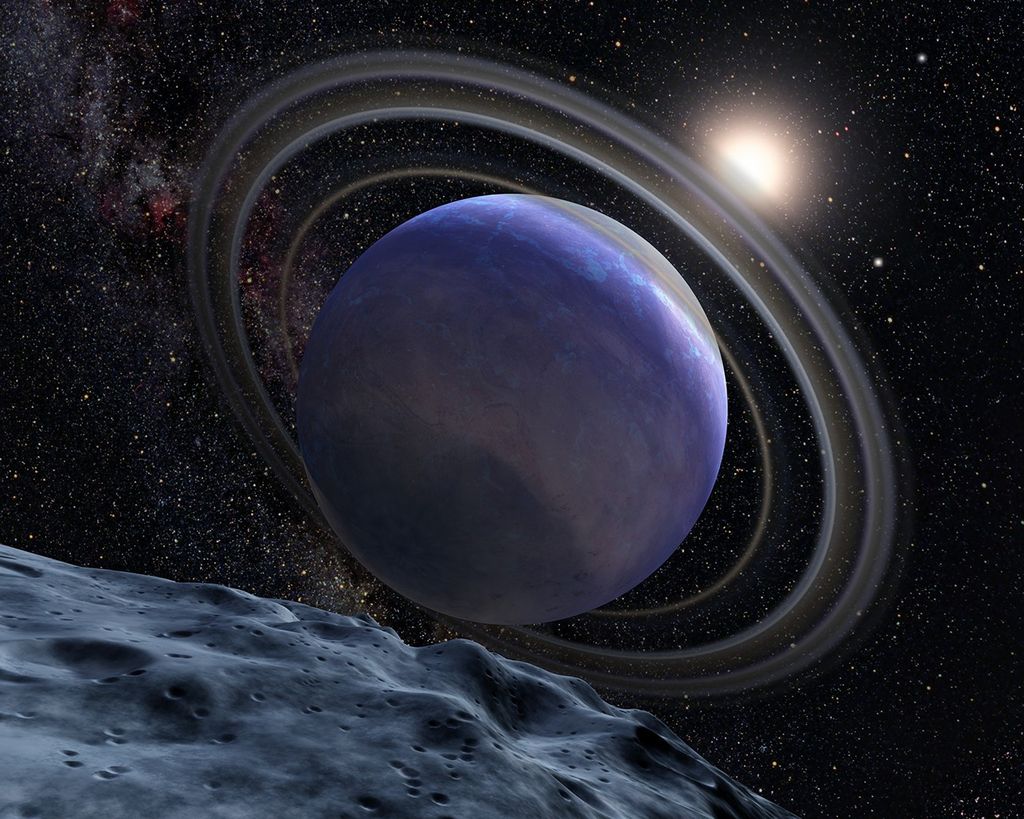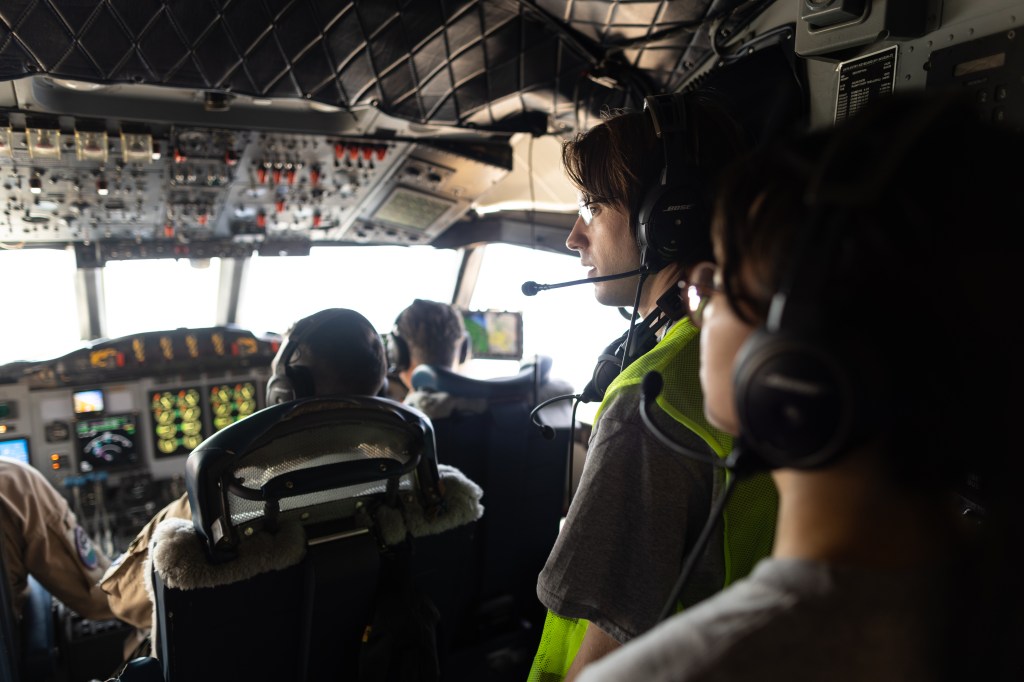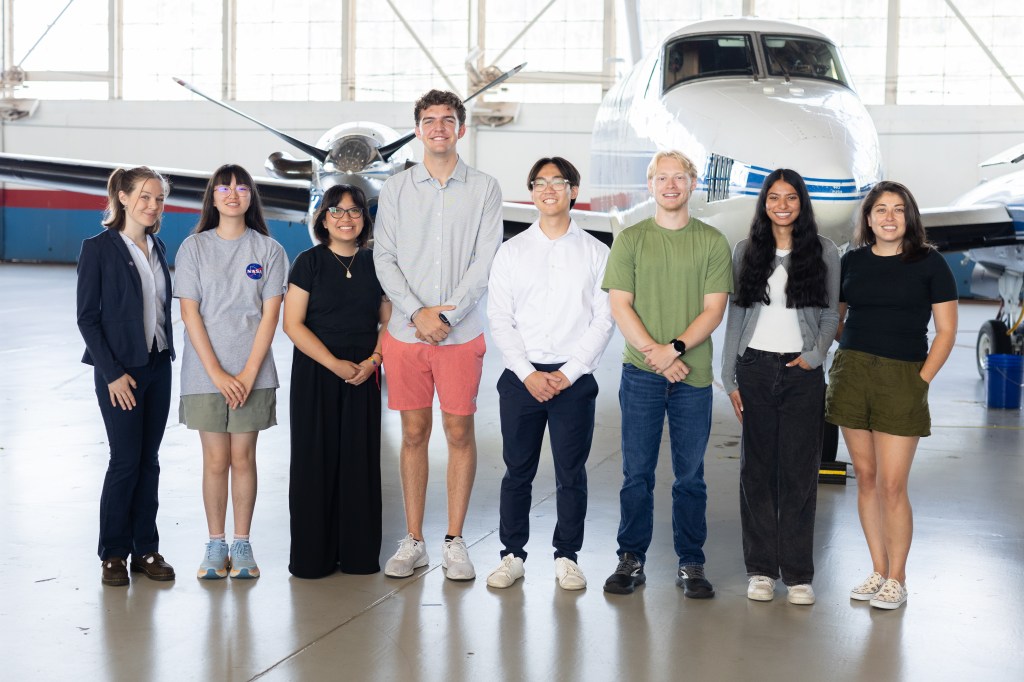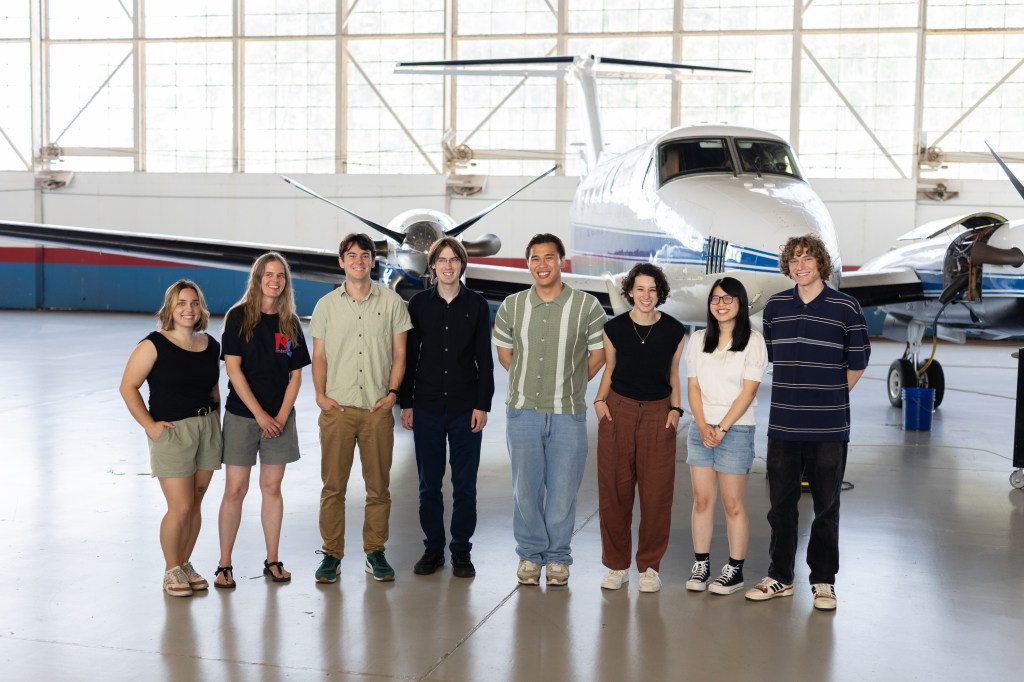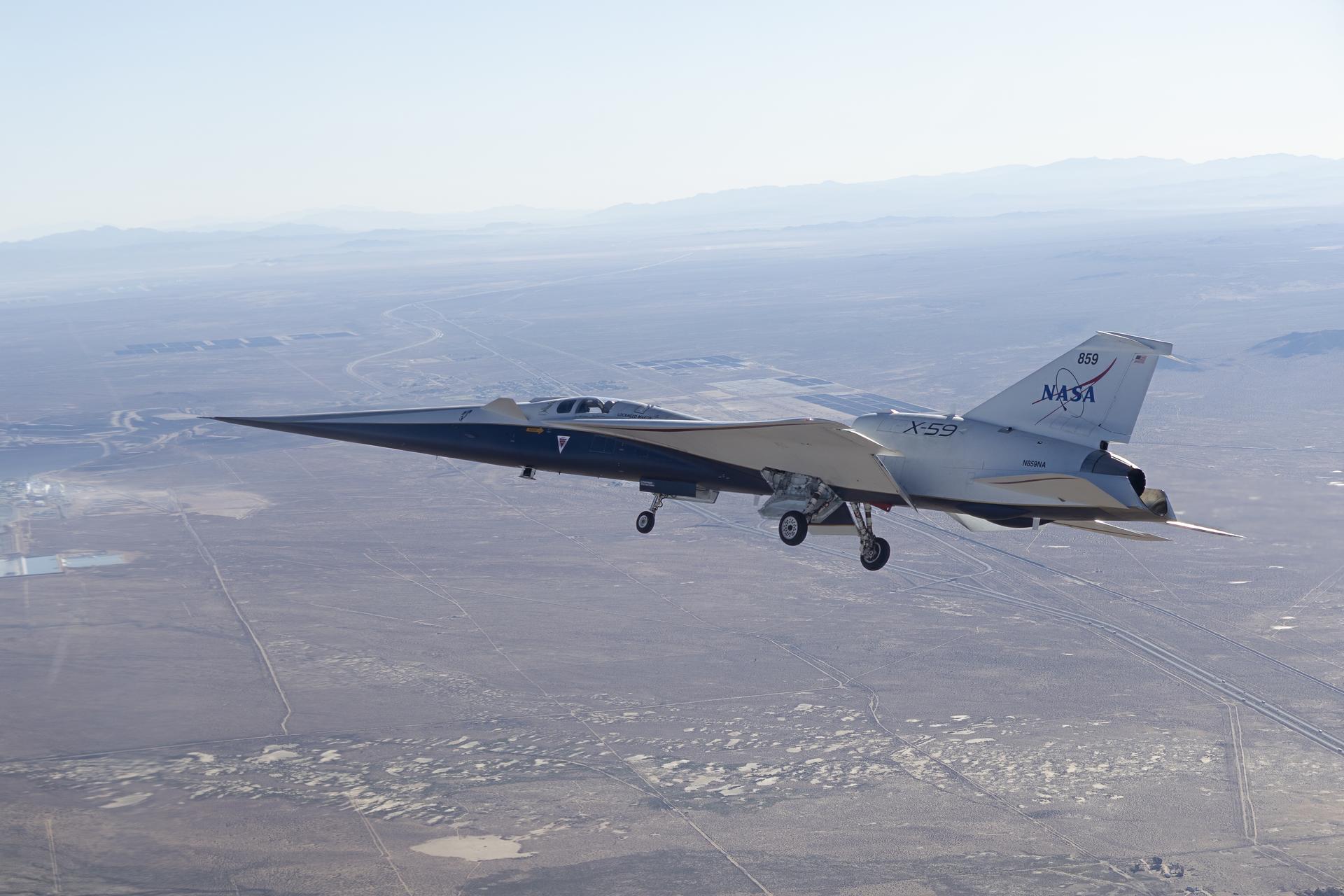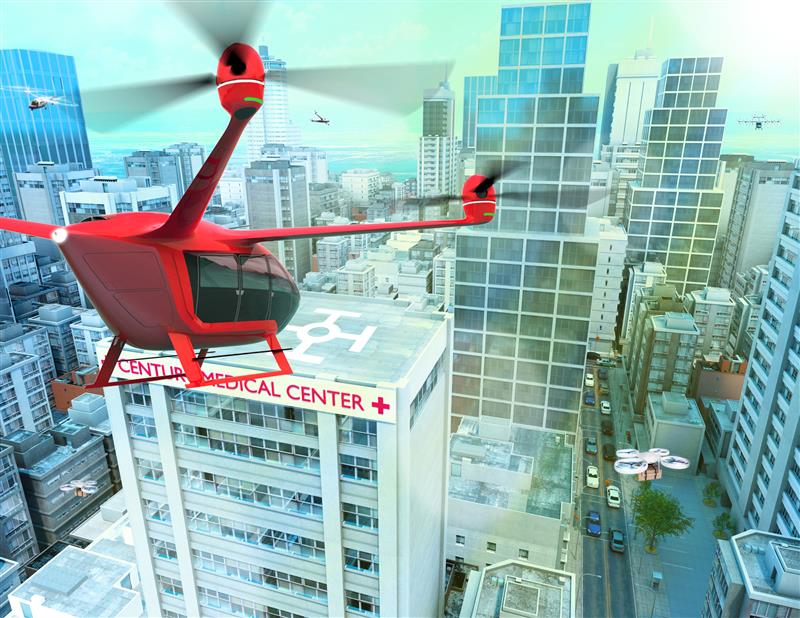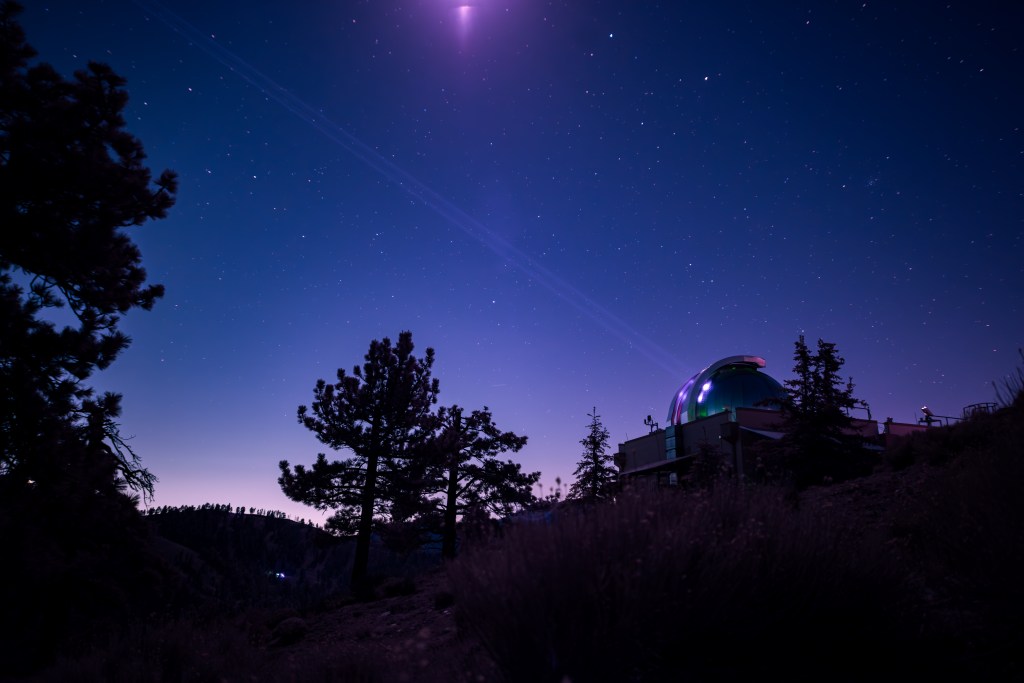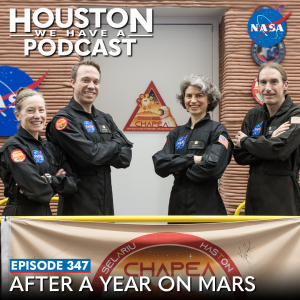
From Earth orbit to the Moon and Mars, explore the world of human spaceflight with NASA each week on the official podcast of the Johnson Space Center in Houston, Texas. Listen to in-depth conversations with the astronauts, scientists and engineers who make it possible.
On episode 347, the CHAPEA Mission 1 crew reflects on their year inside of a simulated Mars habitat and shares their perspectives of what it takes to be a successful Martian crew member. This episode was recorded on July 19, 2024.
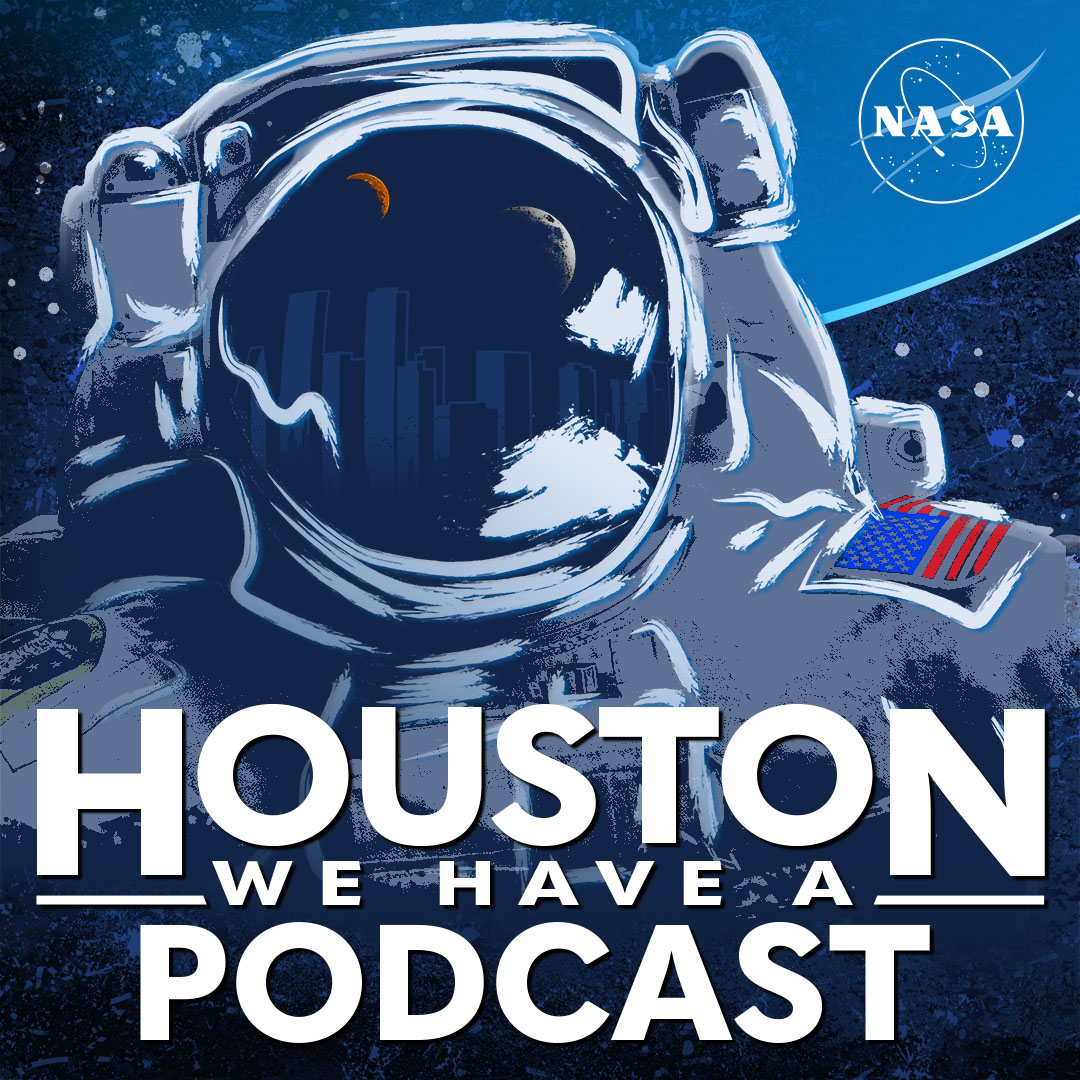
Transcript
Host (Gary Jordan): Houston, we have a podcast! Welcome to the official podcast of the NASA Johnson Space Center, Episode 347, “After a Year on Mars.” I’m Gary Jordan and I’ll be your host today. On this podcast, we bring in the experts, scientists, engineers, and astronauts, all to let you know what’s going on in the world of human spaceflight and more. The CHAPEA crew has wrapped up their mission. CHAPEA, or Crew Health and Performance Exploration Analog, was a yearlong analog mission in a habitat right here on Earth that simulated very closely what it would be like to live on Mars. Every month for a full year, the four-person crew, Commander Kelly Haston, Flight Engineer Ross Brockwell, Medical Officer Nathan Jones, and Science Officer Anca Selariu, carved out just a bit of time to keep us up to date on how they were doing and how they were feeling.
For me, this was a very special experience, like checking in with a family member that’s studying abroad in some distant land. The analog study simulated the time delays that a Martian crew would have to undertake, so there was no way for us to have a live conversation. Instead, the crew recorded short audio logs of their experiences that month based off of some of the questions that we draft for them. On July 6, 2024, they finally egressed, or exited, the habitat and have remained here in Houston for some post-mission research and quarantine. But after almost two weeks, I was able to have a live, sit-down conversation with all four of them for the first time in a year. I was very excited to have this experience and it was great to speak with all four who, unsurprisingly, are in high spirits. Here’s the CHAPEA Mission 1 crew after successfully completing the analog study, enjoy.
[Music]
Host: The crew of CHAPEA Mission 1. So great to be with you today. This is awesome. Congratulations on your egress. I’ll tell you this. It’s been such an incredible journey to be working with you on these audio logs for the past year. For me, it’s been so special cause I almost felt like I was a part of the crew, which I know is a really, probably not the best thing to say cause you guys were the ones actually like isolated in the habitat and I got to go home at the end of the day. But you guys sharing your journey was very, very meaningful to me and to the team. We got to listen to your check-ins every month. We were laughing. It feels like we know you guys. So thank you very much for being here. It is so wonderful to talk to all of you.
Kelly Haston: Thank you. And honestly, you are part of the crew because all of our support is really part of the crew. Like, I think we feel a bit like that about our friends at home and our family as well.
Nathan Jones: Yeah. So important. And I think the people at home were listening, but we were also listening as well.
Host: Yeah. Yeah, that was actually really nice to hear that you were listening to some of the episodes. And you’re right. That’s one thing that you stressed, like all the time in the audio logs, is just really recognizing and appreciating the crew that you had, the support that you had, the family that we’re really all in this together. That team aspect is just, it always came across very clearly. You guys did a great job.
Anca Selariu: And not only that, but this audience, the fact that we knew that there are so many people out there who are inspired by this and they’re continuing to support the idea of going to Mars. And to me that was incredibly important. And I am so grateful to be seeing faces other than the three that we have been seeing for over a year. Not that they’re not wonderful, as I’m sure everybody knows but it’s the diversity of humans and human minds and ideas is really awesome to return to.
Host: Even this is sort of a unique day to be talking the way that we’re talking, right? For the most part, after egressing on July 2, you have been wearing masks and talking with people with masks for a long time. This is day one of without masks, right?
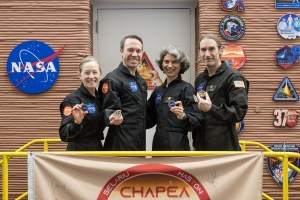
Anca Selariu: Indeed.
Kelly Haston: Yes. On our last day here.
Host: And your last day here. Oh, I’m so happy to be talking with you. Well, listen, let’s review. I think a lot of our audience has been really dedicated to listening to your audio logs. And so we’ll sort of pick up from that last check-in just days before egress. Tell us about that day, the day you were waking up and knowing that it was that day that you were going to be putting on that flight suit and walking out the door, seeing your family for the first time in a year.
Kelly Haston: I’ll start, I guess. So it was actually going to be a long day and we knew it. So we had a set amount of things to do still in the morning, including our normal activities of exercise and sort of getting the hab prepared and final cleaning. So there was actually a fairly normalcy to the very beginning, but I think we were all pretty keen and pretty ready. So, I feel like the crew did an awesome job of sort of getting through your morning activities, sort of doing the last documentations that we needed to, checking on everything, throwing out final things, cleaning, and then we actually kind of just had a little bit of time and a few of us walked around, looked at things, and then we did one special activity together. So I’ll maybe hand it off to Nate and he can talk about that too.
Nathan Jones: Yeah, yeah. I guess I’m the group fun coordinator. So yeah, we actually, throughout the mission, watched quite a few videos together. But one thing that we really found we enjoyed was playing a couple of card games and a game with some dice. And so we actually took some time and sat down and played a game together. One of the last things we did together before we all suited up and got ready for egress.
Host: Ross, take us to the moments before opening that door. You guys were in your suits. I mean, you were seconds away.
Ross Brockwell: Yeah, let me say to that too, just thanks, from me too for this podcast, it really meant a lot to us. It was a lot of fun for us. So, like Anca said, having the support from you guys and from the audience and doing these podcasts was really enjoyable and gave us a lot of opportunities to come together and share thoughts and appreciate the experience. So it meant a lot. Thanks a lot.
Host: We put a lot of thought into the questions every month. And I actually messed up the beginning of this podcast, I’ll be honest, because I did have a question that I wanted to start with. Can you guess what it is?
Nathan Jones: No.
Host: How are you guys doing?
[Laughs]
Anca Selariu: I was wondering how come you weren’t asking us that.
Host: I messed up. I had this whole thing planned and I was so excited to talk to you. I completely messed up.
[Laughs]
Nathan Jones: But you know how we always answer that—
Kelly Haston: Yeah, we’re doing great. We’re doing great. We’re the most boring people on now on Earth.
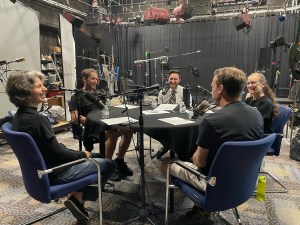
[Laughs]
Host: We addressed this in one of our recent episodes, a couple of times actually. But you say it’s boring, to me, to the audience, it’s so awesome to hear. 11 months, we’re doing great. Like, what? Like, you’re still doing great? That’s awesome to hear. Like, you know, you feel like a family member that you’re checking in on, that you’re just worried about.
Host: I hope you guys enjoyed the doing the logs. I’m sure we were not the only ones that we got to do. And you put a lot of thought into it, right? Anca, I’m looking at you specifically. I just know like every time we heard one of your logs, and this really goes for everybody, you could tell really that there was, you guys read carefully, you knew what you were going to say, that there was, you know, you kind of knew the story you wanted to tell.
Anca Selariu: Indeed, I feel like it’s being away from Earth gives you really a unique perspective, even though you’re still on Earth, if you’re isolated from it, it really brings into focus things that you don’t necessarily anticipate or don’t have time to contemplate. Don’t contemplate your actual connection to Earth. You don’t, you don’t feel it until it’s gone. You take for granted things like being always connected, being always within reach, being able to look up anything and call anyone and meet up with anyone by jumping on an airplane. And to me, it has been a very deep realization what Earth can do, what people on Earth have been able to do, what life itself managed to accomplish on Earth, on this unique planet. And I wanted to share that thought with the audience.
Host: I think I experienced this every time listening to your audio logs, and I hope our audience did, too. It was almost like a monthly reality check. We can all get buried in the day to day very, very easily. Just, you have life, you have family, you have work, you have all of these different things that are just sort of keeping the blinders on, but once a month to hear from you, because you all seem to have this perspective that you were sharing this grandness about life and this appreciation, this positivity that always came through in your audio logs. And it was really a reality check. I remember listening to every single one of them and really just thinking like, my gosh, I need to go on a hike. I need to go see nature. It was just absolutely wonderful. So thank you seriously for doing this. It was meaningful. I was glad to hear it was meaningful for you too. Ross, I want to zoom back to opening up that door just moments before.
Ross Brockwell: Yeah, it was really exciting for sure. I mean, you know, for me, the year went by really quickly, honestly. I mean, people may not believe that, but it’s true. And that day, you know, like Kelly said, we had some time to just kind of savor it and take the last few moments a little slowly so you could just kind of be there in the habitat and be on Mars in your mind, and then think about the transition home, which in reality would probably be a lot more exciting than just opening a door. But that was really, really wonderful. And the reception we got was a surprise and an honor, and it was a really great experience.
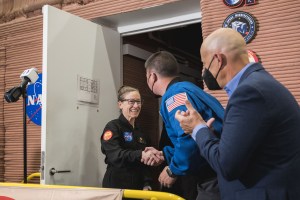
Host: So let’s talk about that. I mean, it was streamed live, we got to see a lot of it. Kjell Lindgren was there, made some beautiful remarks, and we saw you all for the first time live in a while, right? And a lot of us were just clinging onto your words and, you, know, tell us about that experience. You were seeing face, like you were saying Anca, seeing faces for the first time as you were exiting. Tell us about that experience.
Anca Selariu: I thought it would be overwhelming, but actually it wasn’t. It was very energizing. And especially when we heard the knock on the door, Kjell was there. We almost said, “Come in, you’re welcome.” But when you got to actually see the humans behind this entire project that supported this experience there, physically present, and not only that, but to hear the people outside cheering you as you’re egressing, it’s just, I don’t, I cannot really describe that feeling was so complete. You know, it was like a journey that had come to its perfect conclusion. It was a perfectly narrated story, especially for me, because my journey sort of started with hearing Kjell speak about space and exploration and overcoming adversity. And it was really shocking when I heard that he’s going to be there and to actually see him. It was just such a wonderful story for me personally and such a great connection to space and the exploring spirit.
Host: For me, it helped me to sit back and just realize the impact that I think you all, maybe you have, I think a lot of us had a tendency to separate ourselves from that position of inspiration. You look at Kjell and just, you know, he’s a seasoned space explorer. He’s been to space multiple times. And to have that round story beginning and end and be able to communicate that to him, I think is something that you guys can now communicate that I did this incredible thing, and you can too. Just such a powerful moment. Nate, I wanted to give you a hard time, so close, man, you almost made it to the end, to your opening remarks without choking up.
Nathan Jones: Yeah, I know, I know. It’s kind of my thing I guess now. I was a little concerned that would happen and there it was, you know, and I think that there’s nothing wrong with wearing your emotions on your sleeve at some point, you know? And definitely want people to know that, you know, it’s okay to have emotions.
Host: Yeah. No, that’s very good. I think you were, it was your family really, that just seeing them, we were following along every month. And that connection to your family and your family dedicating the time to always be in connection with you, you know, even though you were in this habitat, was meaningful to hear. And that importance of family support and just knowing that you have this background of support that you’re not isolated, right? I think we have, you know, there’s this tendency to think that there’s these four people alone, push them in and let them do their thing. No, there’s a support network on the back. There’s, you know, folks that are connecting you to the family and, you know, just making sure you have what you need and you have the support even though it’s far away, even though it’s with a communications delay, right? You have a bunch of people that have your back.
Nathan Jones: Oh, yes. Certainly. I mean, there’s so many people that we couldn’t do this without them, you know? And including, I think even this podcast was very helpful to us just for encouragement wise and stuff like that. And not just the Houston We Have a Podcast regarding the CHAPEA, you know? But the other ones as well. Just a lot of great information. So thank you for that.
Host: Oh, very good. Well, tell us about embracing your family after those speeches. Of course, all of us were waiting. We’re like, are we going to get to see it? But of course, you know, that was a private moment. Completely understand. These are folks you’ve been in contact with remotely for a while. Tell us about that first embrace.
Kelly Haston: I mean, I would say when I saw my family, even from the stage, I felt immediately very grounded. It was actually like, as Anca said, a really complete moment where you were just, you were nervous before or maybe like, and had high anticipation, but actually spending time with your family for the first time with, you know, that sort of moment where you just get to, you know, be together. It was funny because it was like you wanted to be there and you did take that minute, but then we all actually started mixing and talking to each other’s families as well. So it was actually a little chaotic. I remember trying to like wade through to Casey, Nate’s wife and, you know, cause I’d been in touch with her at times to try to do things, or even just check in on her during the mission. And other people as well. So it was actually really amazing to touch my partner. And I think that he like had this reaction to it that was, it’s actually, it’s almost impossible to say it was such a physical thing, like the delight that he was feeling that we were together. It was a physical reaction as much as emotional. It was very interesting to experience and, and just incredibly special.
Host: Very powerful. Nate, you almost made it through. You saw your family. Tell us about embracing that family.
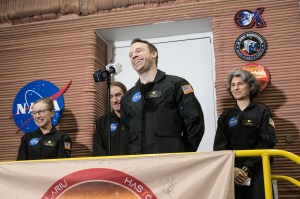
Nathan Jones: Yeah, it was just great. It was around the time of one of my family members’ birthdays. So it was just even more special because of that and got to, you know, just really embrace them and let him know how much I cared about them, and was so thankful for all that he’d done.
Host: The chaos, I mean, seeing so many faces, Anca, you must have, I feel like every, all of you must have just hopped around and just, oh, hi. Hi. Nice to see you. All these people you’ve been in contact with remotely, it must have been special.
Anca Selariu: You just used my favorite word, chaos.
Host: Chaos.
[Laughs]
Anca Selariu: Indeed. I did enjoy the chaos of seeing lots of people moving around and lots of things happening at the same time. And the exhilarated commotion and uncertainty about what was going to happen. You know, I really liked the slight disarray of everything. Where, you know, moving away from something that was fairly, you know, regimented in a way.
Host: Oh, Ross, what about you?
Ross Brockwell: Yeah, I mean, oddly enough, you know, none of us has been off planet for a year before, so we didn’t know exactly how it would go. And, you know, so that moment where you were describing where we come out and we get to see our family. I know me personally, I anticipated that being a very emotional moment. And it’s not just that it’s been over a year, but with the experience we’ve been through, you know? So thinking about that, I, you know, I wasn’t sure if that’s something I would want to, what sequence would I want that to be in? So, you know, I wanted to take part in the ceremony, but obviously I really wanted to see my loved ones. And so I had the same effect that just seeing them in the room meant a lot. And grounded is a good word for that, you know? I felt calm and happy and, you know, I could participate in the ceremony and enjoy it. And then kind of, you know, lead up to the moment where I could actually touch my loved ones again, my family and my girlfriend. It was really, really nice.
Host: Beautiful. Yeah. What did they think about the hair experiment?
Ross Brockwell: Not a lot of positive reviews on the hair experiment.
Kelly Haston: How quickly did that happen?
Ross Brockwell: That was one of the first things I did. So a lot of talk about what meal are you going to eat first? And for me, it was straight to the barber to get my haircut. So I did get, you know, a lot of kudos for my commitment, but not a lot of praise for the actual results of the experiment.
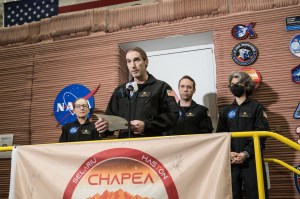
Nathan Jones: I got a lot of pushback from Ross whenever I cut my hair just about a month before the end of the mission.
Ross Brockwell: Yeah. We had two subjects in the experiment.
Nathan Jones: I disenrolled.
Ross Brockwell: One of them was disqualified himself.
Nathan Jones: Casey’s great. But I was getting few too many threats about that. No, not really guys.
Host: You better not, you better not.
Kelly Haston: I do want to give a shout out though to the whole crew that was taking care of us, the whole CHAPEA family, or if we can call them family, but to, you know, the team. Because I think that seeing them was equally as exciting. We had been working with them for the whole year, and we trained with them before. And so they were some of them mixing amongst us while we were seeing our families. And that was actually, I mean, I want to really say how awesome it was to see them too, because in some ways we had been interacting with them more closely at times, you know, obviously still in a distant way so that also was actually part of that whole experience and very meaningful to see people that we had been talking to remotely for so long and who had been taking care of us.
Host: Yeah. That connection is so important. You guys’ stress that in the audio logs. Just that appreciation for having that, right? The folks you deal with on a day-to-day basis, even though it might just be a name or an email, right, or just a voice or a recording, whatever it may be. Those connections are still very real. Not long after you egressed you guys, well, let’s just say this very factually. You couldn’t just egress and then go in the woods and go home and just, you’re done. There’s this post-flight, there’s this post-mission period. There’s a reason you’re still here. We’re recording this on the 19th. You egressed on the 6th. So you guys have been in Houston for a while, not very long after egress. You guys had to ride out one of our famous Houston hurricanes, Hurricane Beryl. Can you talk about the post-flight experience and then that of, now that you’re out of the habitat, you got to ride out an Earthbound hurricane?
Kelly Haston: Well, mother nature was so chased that we had left that it truly, no, it was actually really, I’ve never been in a hurricane, so that was quite impressive. But also really terrible for the area and really impacted so many people that we work with. Right. And also in the state that we don’t know. So I would say it was actually very impressive. But it did sort of alter at the start of our debrief period and slowed it down a little bit in a strange way. Made it actually feel like you were still isolated to some extent. So we went through like a kind of odd isolation in the hotel while we were without power and waiting for the actual debrief to start. Which was, you know, the team was very keen to get started, so we didn’t miss anything. So it was actually an odd, like, pause.
Nathan Jones: I remember a few things being particular from a crew standpoint that I think we all kind of felt, and that was like the quarantine period that we mentioned. We had those masks on up until today around everyone. You know, it was difficult from a standpoint as Kelly pointed out earlier, the first thing we want to do is just really greet and thank all those team members, the broader community of NASA people who have supported this mission. And really, we unfortunately couldn’t. So it was kind of a little bit bittersweet from that standpoint, just cause we really were excited to interact with them and we had to kind of quarantine and then we were kind of hoping, you know, to at least get to interact with them in the coming days. But, you know, the hurricane kind of put a damper on that. As far as my own adjustments post-mission, I noticed like there’s a different pace that we’d adopted in mission as far as communications. I mean, we had a 22-minute delay each way and just a limited amount of communications coming in, you know, and so just someone just hands you a cell phone and it’s got like, you know, bright lights and blinging and dinging and buzzing and so there was definitely an adjustment there. And then I got rescued by a hurricane, you know. We lost telecommunications for a couple days, you know, it was kind of interesting because I remember some of the project leadership were like, you know, we’re so sorry you guys are going with this. We’re like, “Hey, we’re used to it more than, you know, those people, we just practiced for 378 days.”
Host: Yeah. Obviously, you develop this patience when it comes to communication and all of a sudden instant is almost kind of shocking.
Nathan Jones: Right and, you know, and just using the same skills we use in the mission, you know, just to reframe things. I’ve been telling my kids, we’re going to camping with them here soon, we got to camp in the hotel without, you know, the utilities.
Ross Brockwell: And it’s funny too, we’ve been living in this, you know, self-contained, self-sufficient habitat that’s, you know, protected from the harsh Martian environment. It was probably the safest place to be during the hurricane, so could’ve maybe gone back in and laid it out the storm there.
Host: Yeah, it was a building within a building almost. Yeah.
Anca Selariu: To me it was really sad to hear the destruction that some people experienced. But in a way, just like everybody else said, it provided an opportunity to calm down a little bit before hitting the ground back running again. And in a way, I confess that I secretly liked the aspect of losing power because I grew up in Romania and these were fairly, fairly common occurrences where you had to do your homework by candlelight and everything was quiet. And there’s some, you know, romantic vision bringing you back to the basic things that would power, you know, human life like candlelight.
Host: Yeah. That comfort. That sense of ease, whether it was in the habitat or whether it’s back to childhood. Because that’s unique and fascinating to hear about. Not everybody has that sort of comfort that’s based in that lack of instant communication. I think a lot of us experienced this a lack of ease, you know, with the cell towers down and with internet down, it was very hard to let your loved ones know that you were okay here. That could be a really stressful thing, but that patience is a very valuable thing. That comfort can be a very valuable thing in those stressful times. You guys have been doing the post-flight period for quite some time. What else has been, you know, not after Beryl, of course, you had to do some more things. What are some of the things that you’ve been doing in post-flight?
Kelly Haston: I mean, we’ve continued to actually collect data with the team. So there are certain things that we did throughout the mission that they also want post mission data on. So there’s a lot of aspects where we’re just desperately making sure that we actually accommodate all of that with a slightly compressed schedule due to the hurricane. So we really want to make sure that our goal as a team, I hope I can say this is, you know, throughout the mission, we always wanted to be producing the best data possible and the most complete data sets. So I think this was something that the team felt really proud of, that we actually got finished. We completed the mission, and we actually have produced a tremendous amount of data. We really check marked the majority of the boxes given to us. We had completed all tasks assigned. And for the most part on time, like, we very rarely even deviated from that. That feels huge. But we do have more to do now. So we’re finishing. Well now, we luckily are finished. I think that my last meeting was the last data collection. So I think we are now actually able to breathe the sigh of relief and say, now we’re going to celebrate with the people that we’ve actually been working with. And actually say, you know, “We have completed that.” But that has been a major focus this week. However, we’ve been doing some fun stuff too.
Ross Brockwell: No, go ahead. You give ideas.
Kelly Haston: Anybody want to mention the fun stuff? Okay. Well, I’ll give you some prompts. So we’ve hit a few places that we liked pre-mission. Anca has a, a love of froyo, which we’ve accommodated at least once. And we actually got to do some really cool things here at Johnson Space Center. So we were able to attend a few special events, and we actually got to visit a few places that not everyone gets to visit. People have really wanted to give us experiences and then actually risen to the occasion and give us some really tremendous things that we’ll take with us and remember. And we did it together.
Ross Brockwell: Yeah. It’s been really great how, you know, people have expressed a lot of interest. So, you know, across this whole campus, you know, at all levels of the support and spaceflight, people have expressed a lot of interest. So that’s been an interesting and really gratifying and, you know, to have folks really want to know what it was like, and to be able to talk about it, and then to be tied into everything else that goes, goes on around here, was just really an honor. It was really amazing.
Host: The thing involving, like I was thinking today, we announced that we’re renaming one of our buildings the Dorothy Vaughan Center in Honor of the Women of Apollo. And it took everything in my power not to come up to you guys during that cause I wanted to make sure the reunion was right here, but I saw you guys, and it was exciting and it was the very, you could tell that it was like, oh my gosh, the CHAPEA crew is here. You know, like, you guys are really, everybody understands what you guys went through and how important it was. You talked about the importance of data collection and making sure you were checking the boxes and giving a really good data set. A lot of the people here on this campus are the ones that are really looking forward to making sure that that was executed well and getting a hold of that data and starting to work with it. And so, yeah, it’s a very meaningful thing.
At the end of the last audio log, I sort of asked a lot of wrap up questions and so I won’t go too into detail and repeating a lot of those, but there were a couple of things that after writing those questions and having you answer them, I realized we didn’t really close a loop on a couple of things, or at least expand on them. One of them was the fresh harvest. We were really excited when you guys got the fresh harvest and could have that fresh food.
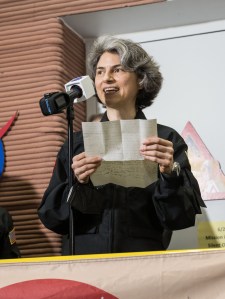
Host: Anca in some of your audio logs. One of one plant in particular that you named, we were very curious on the end of that saga was Minty Nefario. Whatever happened to Minty?
Anca Selariu: Minty. Minty Nefario really wanted to take over the world.
[Laughs]
Ross Brockwell: It was very ambitious. Obviously, it was a very ambitious plant.
Anca Selariu: Yes. And really didn’t care about the dills that were trying to also grow nearby.
Host: Did you have to trim Minty or pull him out altogether, or?
Anca Selariu: A little bit, yeah. We ended up turning him into tea.
Host: Ah, okay. Was that some of the tea drinks and some of the pictures that you saw, or is that something different?
Anca Selariu: It’s entirely possible, but we had other beverages that could look the same.
Host: One of the things I wanted to ask was, you know, reflecting on it now, there’s a lot to CHAPEA that I think you all sort of expressed appreciation in and recognition for. Was there something that you thought was very important to the success of the mission? That I’m really glad I had that, whether it be private quarters, whether it be a TV for you all to watch your shows together, whether it be the plants, was there something that comes to mind that you’re just like, that was really important. I’m very glad I had that.
Anca Selariu: I would like to take a step at it. And say that these three people.
Host: Yeah. Couldn’t have done it if you were alone.
Anca Selariu: These three people that sit at this table that made this happen. The fact that they all wanted it to happen beyond anything else, beyond personal comfort, beyond personal sacrifice. Everything they put in it, they put their heart, they put their soul, their best. And I am really emotional to have to go in a different part of the world and not see their face every day because they’ve been part of me and part of my dream and part of this shared dream of actually achieving something that for so long we thought it was going to be impossible. So I wanted to thank you guys.
Ross Brockwell: Yeah. And I’ll second it. I mean, it’s really special to be a part of a team that, you know, if I’d say so myself has done so well and has had so much fun in this experience. I mean, just from beginning to end, we’ve managed to have a really great time and accomplish a lot. So it’s really deeply meaningful. So, thanks.
Nathan Jones: Yeah. She pre-stole my answer to that question. I don’t know. It must be so close. We’re all reading each other’s minds, you know, after that year.
Host: You spend too much time together.
Kelly Haston: My partner says that. He says, I can see you guys all just reading each other all the time. But I do want to add to that like I do, and I said this when we came out, which is that there was like a shared conversation and a deepness, a richness to the conversation that occurred in the habitat, but it also occurred externally and our people outside, you know, presented us with, you know, the gift of continuing conversations and making us feel part of their life, which is also essential. Like, we had each other and we were very, I believe, a tight unit that just like, you know, functioned to maintain getting this mission done. But without the people outside, you also wouldn’t accomplish that. You can have all the other pieces. You can have, you know, an electronic candle. It really helped me some nights, but that’s nothing, right? And none of the little pieces you bring in or that people even send you electronically that are like reminders. It’s them. And so I would add them to the mix and say that they complemented what we were building inside and made it viable.
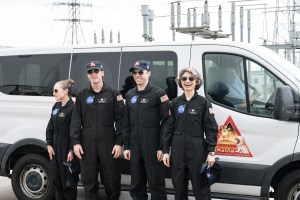
Host: I’ll just say that I think this idea of what you guys are saying is very, very inspiring to me personally. I mean, just like I meant it when you guys said, I asked that question, how are you guys doing? At the very beginning of every audio logging you said, “We’re doing great.” It was so meaningful. And to hear this positivity just around is, you know, I don’t want to say it’s shocking, but it is inspiring and it is amazing that at the end of it, you could be missing each other this much and develop such a good connection. And I think it shows just the kind of people you are and the kind of inspiration that you bring to the table. So with that, I wanted to ask a question, which is the advice really, because I think a lot of people are going to be listening to these podcasts and hearing your audio logs and are really truly inspired and want to be like you in the sense that I want to be a good crew member. I want to be a person that if you were to stick me in a habitat, I would be a good person for that 12 months. And I could be someone who’s relied on, I wouldn’t get aggravated, you know, I can maintain my emotions and establish good connections, check in, not just with my own loved ones, but with other people’s loved ones. So what piece of advice do you have for folks that want to say, “I want to be a good crew member?”
Nathan Jones: I’ve got one. I’ve got actually a couple things. I’d like to say that one, we actually took time in the mission to read a book or kind of go over a book together. And I think I know I got a lot of it, I think the other crew members did too. And it basically was, don’t sweat the small stuff, you know, and there’s just no way you can make it through a year together if every little bump or bruise or discomfort becomes, you know, a mountain. And so I think whenever we keep things in good perspective, you know, we’re able to overcome those mountains and we see them as just little hills along the way, you know, and on top of that and I think I’ve said this before, but I just really can’t emphasize enough how important it is to do hard things. Not for the sake of doing hard things, but just be willing to do the hard things that many people won’t do. And I think that’s what makes all the difference later on. We don’t ever, unfortunately, usually see immediately the benefits of those hard decisions that we make. But I think when we look back, that’s when we really see the benefit of that. So many things that we were able to do in the mission that got us to the end, and we didn’t even realize the implications of it at a time.
Kelly Haston: I think that humans probably evolved this way because being part of a team is the smartest way to get anything done. It’s when you feel responsible someone else, and you don’t want to let them down, it’s one of the strongest motivators for me. I do think that that is human condition and not necessarily unique to us, but I think that we were able to exemplify it in a harsh environment. I would say that you have to enjoy what you’re doing, or at least have a reason for it. And they are different around this table, but then you also have to have that individualism, and then the appreciation for the other persons. And I know I grew a lot in that during this year. I think that, you know, everyone shared so much with me, and it made me sort of broaden in that way and actually also release in certain ways too, you know? So I know that those are sort of vague concepts, but I think that you have to do all the things that, you know, the other members of the crew have mentioned, but bring your own passion to it in your own way. Accept yourself for that, and then accept the other people for their passions. And I think that that will allow people to reach for whatever, and then also ask questions and ask everybody for help. Because honestly, you’ll never get anywhere without help from other people. And that’s how I think we’ve all gotten where we got to in our lives.
Host: Well, I meant it, it’s just been such an honor to follow you for the past year and to listen and check in with you and for you to be a part of this podcast and share that these stories. I mean, it’s been super inspiring to me, and I hope to others as well. I think I’m the last thing, one of the last things on your to-do list before you get to go and enjoy dinner with the team and go see your families and go out into nature and do great things. And so I will not keep you any longer CHAPEA Mission 1 crew. Thank you so much. It’s been a pleasure of a lifetime to be following you and working with you throughout this mission. I wish you all the best in everything you have for what’s to come for the future. Thank you.
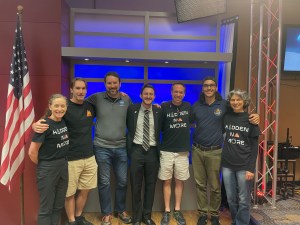
Nathan Jones: Do we get to end with our chant?
Kelly Haston: Sure we do.
Nathan Jones: Our modified chant.
Kelly Haston: Thank you so much, though. Thank you. It was really, really an honor and a pleasure to be part of your podcast.
Host: Modified chant. Let’s do it.
Nathan Jones: We didn’t die. What do you think?
Kelly Haston: Let’s go for it.
Nathan Jones: Alright. 1, 2, 3.
All: We didn’t die!
[Laughs]
Kelly Haston: Thank you everyone.
Ross Brockwell: Yeah, thank you very much. It’s been wonderful.
[Music]
Host: Alright, that’s it from the crew from Dune Alpha. Thanks for sticking around. I hope you enjoyed the crews’ journey from start to finish. If you didn’t see all of the episodes or listen to all of the episodes, you can always check out our full collection at nasa.gov/podcasts. Listen to “A Year on Mars” and all of our Mars Audio Logs, numbers 1-12. Check out nasa.gov for the latest on the CHAPEA mission and everything going on here at the Johnson Space Center and with human spaceflight. You can go to nasa.gov/podcasts to check out our collection of episodes and listen to any of them in no particular order and see the full collection of other shows we have across the agency. On social media, we’re on the NASA Johnson Space Center pages of Facebook, X, and Instagram. You can use #AskNASA on your favorite platform to submit an idea, just make sure to mention it’s for us at Houston We Have a Podcast.
Thanks to Will Flato, Dane Turner, Abby Graf, Jaden Jennings, Dominique Crespo, Laura Sorto, and Kelsey Spivey. Thanks to Grace Douglas and Jennifer Miller for their support in allowing us to dedicate some time to speak with crew every month and for reviewing these episodes. A big thanks to Kelly Haston, Ross Brockwell, Nathan Jones and Anca Selariu for sharing their experience for this audience on Houston We Have a Podcast. Give us a rating and feedback on whatever platform you’re listening to us on and tell us what you think of our podcast. We’ll be back next week.
This is an Official NASA Podcast.

